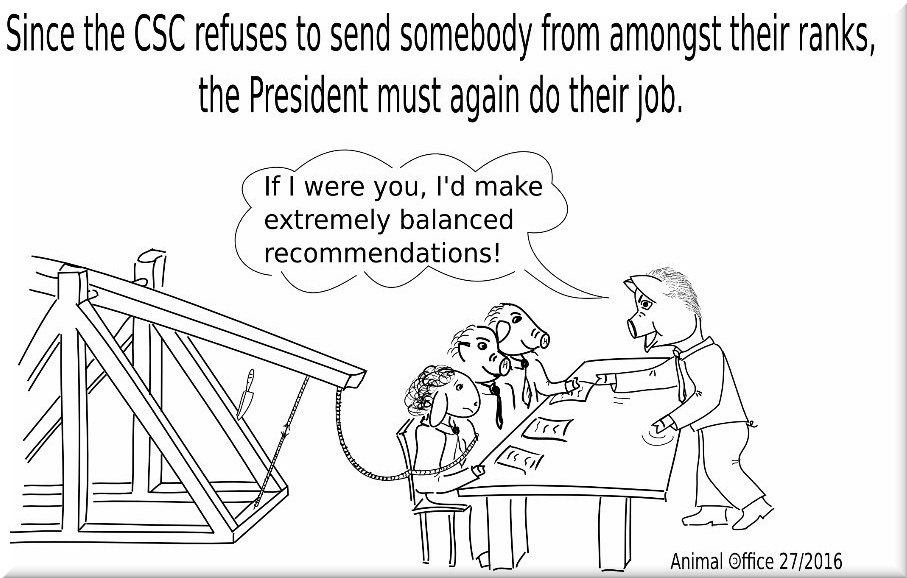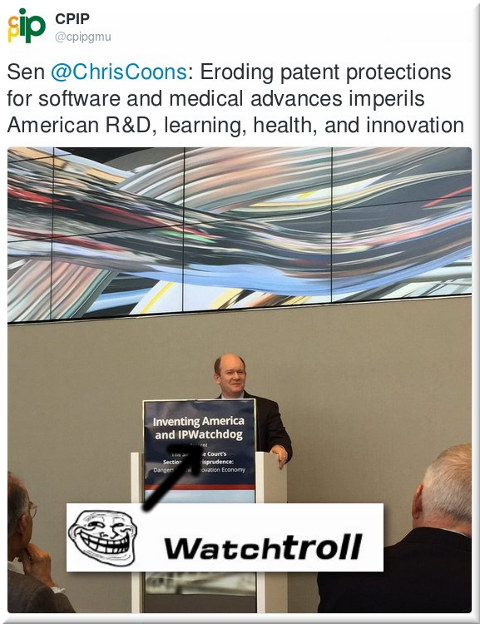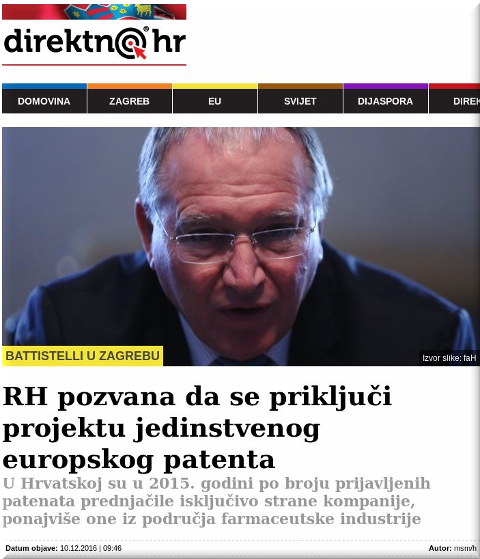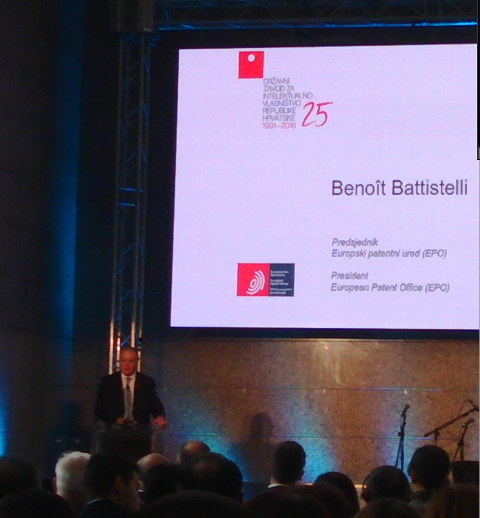12.12.16
Caricature: The European Patent Office Finds Quick Fix for ILO

Summary: The reality of justice with jurors under Team Battistelli’s furor

Summary: The reality of justice with jurors under Team Battistelli’s furor

Summary: An outline of one week’s news regarding software patents in the United States, with special emphasis placed on key foes and allies of GNU/Linux
THE USPTO can no longer grant software patents as routinely as it used to and some people are upset about it. These people, however, do not develop software.
“Sen Chris Coons,” according to this tweet, says that “Eroding patent protections for software and medical advances imperils American R&D, learning, health, and innovation,” but this coming from guy who never wrote a single line of code in his entire life does not mean much. Maybe he’s just funded by some large company that is pursuing software patents (like IBM and Microsoft). Moreover, with Watchtroll branding on the podium (see the photo), we assume that Chris Coons came there to serve patent maximalists, who have grown quite loud recently. Benjamin Henrion responded by saying that “software patents shifts R&D budgets to P&L.” (patents and litigation)
We are troubled to see the voices of the patent microcosm growing even louder in the wake of Trump’s election win. They want change and they want this change to harm software developers so that they can profit from (or tax) actual producers. IBM, we might add, is a growing part of the problem. Does IBM even realise to what degree it alienates the Free software development community by advocating software patents all the time? Does IBM truly realise that it aligns itself with patent extremists that insult judges and push for software patents based on self-serving lies? Does it care? Does IBM realise that by paying the former Director of the USPTO it participates in institutional corruption? And again, does it care? By lobbying to annul the Supreme Court’s decision and elevate less than a handful of Appeals Court (CAFC) decisions these people reveal their true face and selfish interests, which happen to harm every software developer around the world. It harms developers of both proprietary and Free/Open Source software.
Speaking of the Appeals Court, also published (albeit behind paywall) is this article titled “Appeals Court Casts Doubts on Smartflash’s Patent Win Over Apple” (we mentioned this before). “Two judges signaled the patents claim ineligible subject matter under Section 101 of the Patent Act,” says the summary. This article is mirrored here (also behind paywall). Section 101 certainly gets taken into account by CAFC, but patent law firms like Finnegan continue pushing the envelop on lies that software patents still have teeth in the US. It’s that usual cherry-picking of CAFC cases. Baker Botts LLP has just done the same thing. Don’t fall for it. In the vast majority of cases, including in 2016, CAFC rules against software patents and Section 101 remains very strong an argument against software patents. Watch this new docket report that says:
The court denied defendant’s motion for summary judgment of invalidity on the ground that plaintiffs’ call center telecommunications patents encompassed unpatentable subject matter because the motion obscured patents’ complexity with reductionist simplicity.
The recurring theme here was covered in almost a hundred Techrights articles. It definitely seems as though software patents aren’t coming back any time soon (if ever), but the patent microcosm sure is trying to accomplish that.
Adam Mossoff, who works for a Conservative think tank and has a history of rather aggressive patent views (we covered these in [1, 2, 3]), is trying to shame Congress into pushing for reinstatement of software patents, based on misinformation. “Today,” he summarised it, “Congress should save software again by expressly confirming that it is a patentable technological invention.”
Nonsense.
If anything, software patents caused a lot of damage. But then again, judging by Mossoff’s paymaster, reliance on facts is almost a sin. Look where they stand on issues such as climate change.
“But this essential technology in our modern innovation economy is at risk,” Henrion quotes him as saying, responding with “yeah copyright replaced by patent trolls…”
Another person responded with “and look at the Patent Troll mess Software Patents has left us in…”
Exactly. Mossoff, as we pointed out here in the past, became a voice of patent trolls and the patent microcosm. He’s not a software developer and he merely ‘hijacks’ the voice of those who are with a nonsensical headline like “Congress Saved Software in 1980, and It Should Do It Again Today” (in a neo-Conservative Web site, of course).
This article seems to be one among several. The patent microcosm wants software patents back, unlike actual developers. Watchtroll is pressuring Congress on this subject also, most recently with yesterday’s headline (yes, a Sunday!) “Congress Can Save Software Patents by Repeating One of Its Successes”.
It’s just a bunch of mumbo-jumbo urging Congress to reinstate software patents and some of this mumbo-jumbo is promoted by IBM’s patent chief. Patent trolls proponents like Adam Mossoff are intentionally conflating software with software patents (one destroys the other) and then some IBM lawyers deems it cite-worthy? How stupid does IBM want to look here? It’s only going to harm the company’s relations with developers.
Contrast this with the following new article from Allen Lo, who is deputy general counsel for patents at Google. He published “Protecting Alice protects patent quality and technological innovation” and said in it:
The goal of the patent system, as set forth in the Constitution, is to promote the progress of the “useful arts,” which has always been understood to mean technological progress. Here at Google, we are proud of the many ground-breaking software inventions by our engineers that have allowed us to file a growing number of high-quality patents and establish a strong and valuable portfolio.
While Google and many other tech companies invest many billions of dollars in research and development (R&D) to make these inventions – and these patents – possible, not all software patents issued by the Patent and Trademark Office (PTO) are of high quality. A series of roundtables recently convened by the PTO in Alexandria, Va.; Stanford University; and other locations around the country explored one of the most important tools for improving the quality of software patents and ensuring that only worthy patents are approved.
That tool arises from the unanimous 2014 Supreme Court decision in Alice Corp. v. CLS Bank International, which established that software patent claims that recite a financial arrangement or broadly describe a function performed “on a computer” or “on the internet” are not eligible to be patented. Before Alice, applicants were obtaining patents from the PTO that were not based on any technical contribution or innovation, often not even providing an explanation of how they expected to achieve a result beyond stating that it would be done “on a computer.” Case law and PTO practices had swung too far toward allowing these low-quality claims to remain unchallenged, and a course correction was needed.
So we’ve covered IBM, Google, and what about Microsoft? Well, Microsoft is in the same boat as IBM when it comes to software patents and its patents have just survived CAFC’s scrutiny, based on this new report that says:
Microsoft has survived an appeal against a lower court decision that it didn’t infringe patents belonging to Impulse Technology.
Yesterday, December 8, the US Court of Appeals for the Federal Circuit affirmed the ruling of the US District Court for the District of Delaware, granting Microsoft’s motion for summary judgment.
In 2011, Impulse sued Microsoft, alleging infringement of 15 claims of the asserted patents: US patent numbers 6,308,565; 6,430,997; 6,765,726; 6,876,496; 7,359,121; and 7,791,808.
Truth be said, large companies don’t mind the patent mess because they can afford to pay the legal fees and this whole mess harms small companies the most. Here is a 15-page PDF of a paper by Professor Lemley et al in which it’s said (by Patently-O) that “patent litigation outcomes vary according to the identity of the patentee” or to quote Patently-O‘s summary: “The sales market for patent rights continues to vex analysts – especially in terms of valuation. In their Patently-O Patent Law Journal article, Professor Mark Lemley teams up with the Richardson Oliver Group to provide some amount of further guidance.”
It’s no secret that there is gross discrimination in patent systems, even in the EPO.
Part of the patent microcosm, or pushers for software patents (Bilski Blog), chose to distort the narrative of software patents (for large businesses, in bulk) and instead went with this narrative which would have us read about the “little guys”:
From the beginning my application was rejected, and continues to be rejected, under Section 101, even though we have recently overcome all of the prior art rejections. As a result, I have become something of an accidental student of patent eligibility and as such was very interested in attending the USPTO’s Patent Subject Matter Eligibility Roundtable I on November 14, 2016. Prior to the roundtable, I had assumed that my application was something of an outlier, that there was something wrong with it and that was why it had been rejected. At the roundtable I learned that “it’s not me, it’s you” applies not just to exes but to the patent system as well.
[...]
The few speakers at the roundtable who did advocate on behalf of us “little guys” often mentioned how the “direct costs” negatively impacted micro-entities, focusing on the need for examiners to avoid using “blanket statements,” to be specific in their responses, and carefully ensure the law is being properly interpreted and applied on a case by case basis. As a solo entrepreneur, I couldn’t agree more with the need to “get it right the first time,” as this would substantially reduce direct costs for us. My impression is that the examiner’s first instinct is often to reject without any substantive reason, hoping we’ll simply abandon the process altogether, or better yet, pay the ever increasing, exorbitant fees (for me) involved in requests for continued examinations and the appeals process.
This thing which the USPTO called “roundtable” was just an echo chamber. See our article about it and then see this article from Scott Graham of The Recorder (behind paywall). To quote the outline: “A discussion Monday at Stanford University was an opportunity for big tech companies, entrepreneurs, bar associations and academics to hash out the impact of ‘Alice’ and other developments in patent eligibilty.”
This was cited by IBM’s Manny Schecter (IBM is still dissatisfied because there is no software patents certainty and IBM attacks small companies using software patents). There was “no software developer around the table,” Henrion told IBM’s Manny Schecter, “how broken is that?”
Well, this whole “roundtable” was nonsense, or an exercise in fake transparency, giving the illusion of public participation in decision-making while excluding the main stakeholders (who actually produce something).
“If you write code,” I told Manny in relation to this tweet of his, “maybe you’ll understand it’s mumbo-jumbo buzzwords” (he wrote “Abstract? Technological? Concrete? Practical application? Exactly. From #patent perspective these simply cannot be defined precisely.”)
Henrion added, “Tangible?”
All those silly words are so often used by non-developers who try to convince us developers that software patents are desirable.
Witness how Watchtroll’s site wants to crush patent reform and harm actual producers of software etc. The title says “Advice for the Trump Administration and New Congress: Protect Bayh-Dole and Restore the Patent System” and it’s more like the above pattern of lobbying, which we are seeing more of these days.
Not too long ago Watchtroll called reformers “Patent infringer lobby”, leading people in the patent microcosm to saying stuff like: “Patent infringer lobby pushes Trump to aggressively pursue “patent reform” https://lnkd.in/fasm8pZ Time to call out deliberate infringers.”
Well, time to call out Watchtroll who didn’t write any code, doesn’t know how programs work, yet lobbies for software patents.
“Nice bullshit spin on the issue,” wrote a technical person (Raphaël Jacquot) about the above. Henrion wrote, “restore software patents and patent trolling.”
Good for the patent microcosm after all, and we know at whose expense…
Speaking of trolls, Blumberg who used to work for for the world’s largest patent troll, Microsoft’s patent troll that’s connected to Ray Niro (who is now dead), is quoted by IAM as saying: “In our view, Germany is the new Eastern District of Texas. That’s the venue that gives us the most concern.”
Blumberg is now working in Lenovo, which is believed to have colluded with Microsoft to block GNU/Linux (they denied this after actually admitting this).
Concerns about Germany becoming another/new Eastern District of Texas are real because of the UPC ambitions, which will thankfully never reach London. Alexander Esslinger (a.k.a. Patently German) wrote about the above quote: “Really ? At least of owners of SEP’s it is not so easy to get an injunction in Germany based on interpretation of ECJ Huawei-ZTE…”
“Is that a bad thing,” I asked him. He later responded to that, but one must remember whose side he is on. He’s not interested in a sane patent system but a system from which he profits more. Like Bastian Best, who spreads misinformation (biased by omission; fails to mention those ~80% of CAFC cases that send software patents down the sewer), he wants more patent litigation in Germany so that he can profit from that. IAM is on the same side as them and it’s eager for everyone to celebrate patent trolling that’s coming from the Far East. Here is the latest example of that: “Barely a week after KAIST sued several major tech companies in what appeared to be the first ever patent infringement action initiated by an Asian university in the United States, another Korean educational institution has launched its own assertion campaign in the Northern Districty of California.”
Remember that these are non-producing entities that are funded by public money.
Citing Microsoft and its massive patent troll (Intellectual Ventures), IAM also pretends that lowering patent quality is a good thing:
Perhaps the most striking thing was how quickly some of China’s major tech companies have become sophisticated IP players. Xiaomi’s progress in particular has been remarkable and with former IV IP executive Paul Lin on board, the company has one of the most experienced operators in the local monetisation market.
Xiaomi’s deal with Microsoft, announced in May this year, was in the spotlight on day 1 as Lin joined the software giant’s Micky Minhas to dissect one of the leading IP-driven transactions of 2016. As part of that agreement Microsoft sold the Chinese company 1,500 patents, giving Xiaomi a much-needed boost to its portfolio as it weighs up expansion into the US. For all that conditions are widely seen to have deteriorated for many patent owners in the US, the deal shows that American assets will always remain a crucial part of any company’s IP strategy be it focused on freedom to operate or monetisation.
Xiaomi’s patent settlement with Microsoft was an attack on Linux and on Free software, as we explained at the time. Given China’s approach towards software patents (the opposite of what the US is doing), we’re not too shocked to see this happening, but that does not mean we have given up, either. █
Does changing an organism genetically (by selective breeding or gene editing) give one ownership of anything new of its kind?

Summary: In an age of patented pigs (EPO) and plants/seeds it’s important to keep an eye on the CRISPR patent dispute
OUR previous post covered the Supreme Court’s (SCOTUS) upcoming decision on Life Technologies Corp. v Promega Corp. — a case that can certainly impact patent scope at the USPTO, much like Mayo did.
In related news, CRISPR will be challenged quite soon and the patent microcosm isn’t too happy about it. “Open Source Advocates Want CRISPR Technology to Be Free,” one patent maximalist wrote (paraphrasing the headline). Well, “Open Source Advocates” are not alone in this and the key question here is patent scope, not cost. As Benjamin Henrion put it, “does it take the form of a computer program?”
Well, patents on life are certainly a step too far. We need to ask ourselves who benefits here. See the new article titled “This Is How the CRISPR Trial Will Determine Our Future” (from Vice):
Arguments in a trial to determine ownership of CRISPR, a gene editing technology, started Tuesday in Virginia. The outcome will determine who gets ownership of an incredibly lucrative and incredibly powerful tool that has the potential to “treat” genetic disease.
Two groups are contending for the editing technology patent: on one side is MIT’s Broad Institute and Harvard University, and on the other is the University of California, Berkeley.
The first patent for this technology was filed in 2012 by University of California, Berkeley, researchers for their work describing how genes could be edited in-vitro, The Scientist reported. Later in 2012, researchers at Harvard and MIT filed a patent for editing genes in eukaryotic cells—like those in a forming baby. The UC Berkeley researchers claimed the second patent violated their patent, and this week’s trial will determine who gets intellectual rights to the technology.
The following article was sent to us by some readers over the weekend:
They lined up early Monday morning for ringside seats at the most sensational scientific showdown in the modern era.
The moment the doors opened, lawyers, reporters and hedge fund investors raced for a spot in the cramped, windowless U.S. Patent and Trademark Office in Alexandria, Va.
The tension in the room was electric, as the historic fight for the patent rights to the CRISPR gene editing technology got underway.
CRISPR (Clustered Regularly Interspaced Short Palindromic Repeats) is a revolutionary gene editing tool that allows scientists to edit DNA with unparalleled ease and precision. Two prominent public institutions — MIT and Harvard’s Broad Institute and University of California Berkeley — are locked in a legal cage match, fighting to privatize CRISPR.
It could be months before a victor emerges, but the winner will walk away with billions of dollars in licensing fees and total control over one of the world’s most important scientific discoveries.
The Atlantic too has explained the importance of this case:
Nobody could recall such a long line at the U.S. Patent and Trademark Office. On Tuesday, more than an hour before the scheduled hearing for a bitterly contested patent dispute over the gene-editing tool CRISPR, a line of lawyers, journalists, and biotech industry execs had snaked through the lobby and across the giant Christmas tree that bedecks government-agency headquarters at this time of the year.
Of course, the dispute over CRISPR is no ordinary patent battle. CRISPR is a potentially revolutionary technique that is so broadly useful across medicine, agriculture, and industry that it could earn the dispute’s winner billions of dollars. Lawyers for the University of California, Berkeley, and the Broad Institute of MIT and Harvard both argue that their scientists had invented CRISPR first.
The hearing was part of something called an interference proceeding—a piece of patent law that is quite literally archaic now. On March 16, 2013, the U.S. patent system switched the way patents are awarded: Previously, a patent was granted to the very first party to invent something; now, a patent simply goes to whoever files a patent application for an invention first. As it happened, Berkeley filed its initial patent just one day before the March 16 switchover. So here we are trying to figure out who invented CRISPR first.
“CSIRO [of CRISPR infamy received] a fair amount of undeserved bad press,” IAM wrote (defending CSIRO, obviously!), “some even going so far as to label it a ‘troll’” because it is (see our wiki page about it).
Will this madness finally end, at long last?
More patents do not imply more innovation. The Appeals Court, according to this new article from Mike Masnick, also reminds us that “Patent Infringement Is Good For Competition”.
“Of course,” Masnick writes, “if you’re playing along with the home game, you should already be scratching your head. After all, patents themselves are monopolies. So, if anything, you’d think that any antitrust argument would be focused on the patent holder rather than the patent infringer. But, here, RTI is arguing that the patent infringement itself is a form of an antitrust violation, as it’s part of BD’s effort to foreclose competition.”
Faulty logic. For over a decade we have said the same thing about patents, even back when Microsoft used them to expand its monopoly and assert authority or reign over Novell (and by extension GNU/Linux). If only more people cared to study the real (original) purpose of patents and their impact on competition, a lot of those puff pieces about “innovation” would be long gone. █
Better hurry up before Trump ruins the Supreme Court

Summary: Additional and belated remarks about Apple’s patent attacks on Samsung’s Android phones and the upcoming Supreme Court (SCOTUS) decision on Life Technologies Corp. v Promega Corp.
THINGS are about to change for the better at the USPTO because upcoming SCOTUS cases won’t challenge Alice (applicable to software patents) but instead jeopardise other kinds of patents.
Regarding the unanimous decision in favour of Android or Linux or Samsung (depends on how one looks at it), there have been endless streams of articles by now. We saw hundreds of articles in English (about 300 articles!) about it, not counting all the Apple fan blogs and articles in other languages. There’s also my personal take on it, as covered the other day (hours after the decision had been handed down). For those looking for some decent coverage, see Jurist, AOL, Ars, El Reg or even lesser known sites. Less objective (for either side) were IP Watch, MIP, TechDirt, and Bristows staff at IP Kat. Be careful of Apple advocacy sites disguised as news sites. Even SJVN decided to cover it, although it’s typically outside his scope. Florian Müller did a blog post about it and said: “Large parts of the (U.S. and global) tech industry will breathe a sigh of relief now.”
“We must understand that when it comes to patents the quantity (the more, the merrier) and quality (more is less or less is more) should be grounded on evidence-based analysis, not Battistellite ‘logic’ and Republican instincts.”“Yesterday’s Supreme Court ruling,” he later added, “means design patents won’t spell doom for alleged infringers anymore, but a lot depends on the Fed. Circuit” (CAFC). “The Supreme Court said what the Fed. Cir. got wrong; but now the same Fed. Cir still has to get it right,” he continued. “In 2017, we’ll see what happens.” As we noted here before, only the lawyers win in these disputes that last half a decade or longer.
IAM always complains when patent scope is restricted and this time was no exception; they’re hardly even closeted about their patent maximalist bias.
The net outcome here is a major loss for another kind of patent. We must understand that when it comes to patents the quantity (the more, the merrier) and quality (more is less or less is more) should be grounded on evidence-based analysis, not Battistellite ‘logic’ and Republican instincts. The EPO now moves in the opposite direction, broadening patent scope rather than tightening it.
SCOTUS is going to tackle another kind of patents quite soon (Life Technologies Corp. v Promega Corp.), as an article by Dennis Crouch, another from MIP, and more from patents-centric sites state with concern. Many articles have appeared in recent days and most of them are from the patent microcosm. We too mentioned this case before.
We continue to worry that Trump-appointed Justices (new appointees) to SCOTUS will ruin all/most of the patent progress made in recent years. Conservative think tanks, for example, are out in full force calling for the end of Alice as we know it. We’ll cover that separately later tonight. █

Summary: Croatian media helps Battistelli promote the UPC in Croatia, yet the EPO says nothing about it and the subject of criminal charges against the EPO’s Vice-President (Topić from Croatia) isn’t even brought up
SO-CALLED ‘reform’ at the EPO turns out to be a race to the bottom of everything, except litigation (more and more of it). “Residents of EPC contracting states can perform all procedural steps before the EPO,” the EPO wrote the other day, but “not in their language,” Benjamin Henrion responded. In other words, services are getting poorer (we have heard such stories from British applicants who complained that the EPO could not even properly deal with English). Imagine what a mess the UPC would be when it comes to languages — a subject we covered here many times before. It’s one of the main reasons Spain opposes the UPC, which will probably never take off anyway (not in its current form). If people need to hire the patent microcosm for services such as translations, not just legal advice, who is this whole system good for? Surely the middlemen, not the inventors. It’s especially prohibitive — from a financial point of view — to SMEs, which is why they oppose the UPC (don’t believe what the EPO and Team UPC say on ‘their behalf’).
“Quite a few people wrote to us about it, yet the EPO keeps absolutely quiet about it.”The EPO’s lies have become so routine that they’re mundane and banal now. EPO workers hardly believe anything their management says (and rightly so!). In fact, even EPO-friendly media like MIP refuses to accept this latest lie, not a study (commissioned by the EPO and EUIPO themselves, to assess themselves!). “This study by @EPOorg & @EU_IPO analyses the contribution of IPR-intensive sectors to the EU economy,” the EPO wrote a couple of days ago, but what they generally do is attribute the success of any domain where patents are grantable to the EPO and EUIPO, then pretend that they are worth trillions. We already mentioned this lie, which is habitually being used to promote the UPC.
The EPO is meanwhile providing a sort of UPC ‘attack map’, almost as though it’s pitching/speaking to patent trolls and showing off to them just how many companies in how many nations they’ll be able to attack with an EP and one single court ruling (in a foreign language).
Amid all this nonsense from the EPO’s Twitter account there is absolutely no mention and no announcements about Battistelli and his visit to the country where his bulldog is accused of serious crimes, as we first noted yesterday morning. Quite a few people wrote to us about it, yet the EPO keeps absolutely quiet about it. No Battistelli photo ops with Željko Topić’s protectors/successors at SIPO Croatia? Did he meet them to say something?
“This time, for a change, Battistelli did not just dispatch some UPC ‘lobbyist’ like Margot Fröhlinger or Grant Philpott.”Regarding “Battistelli in Zagreb,” one reader told us, “State media servis [sic] of Republic of Croatia – HINA, (www.hina.hr) made [an] interview with B. Battistelli.”
Here is coverage (see screenshot above) other than HINA news about Battistelli in Zagreb.
We waited patiently for more information as quite a few people appear to be talking about it and they are generally disturbed by this for numerous reasons.
“Regarding Battistelli’s visit to Zagreb,” one reader told us having sent more information, “I got this from Croatian sources.” We remind readers that Topić has quite a few enemies (or victims) in Zagreb and they too are eager to see this man facing justice, even arrested like some of his old friends. To quote the information we received:
Battistelli and Topić were guests at the celebration of SIPO’s 25th Anniversary which took place in Zagreb on December 9th.
According to information from sources in Croatia, the preparations for the event took place in great secrecy and the SIPO didn’t make any prior public announcement on its web site.
The celebration was formally held “under the auspices of the Government”, but the Croatian Government refused to contribute financially.
The Assistant Minister of Science Krešo Zadro was sent as the Government representative. This could be interpreted as a subtle diplomatic snub to Battistelli who prefers to have his events attended by top-ranking Ministers.
Sylvie Forbin, a deputy Director of WIPO and Christian Archambeau from the EUIPO also participated.
Unofficial sources say that the SIPO Director Kuterovac got funding for the event from EPO and WIPO.
A puff piece with photos is likely to appear on the SIPO website next week.
Here’s the link to the SIPO website
http://www.dziv.hr/hr/novosti/
http://www.dziv.hr/en/news/A short report about the event appeared on the Croatian news portal “Panopticum”.
http://panopticum.hr/2571-2/This report does not mention that Topić was in attendance.
An English translation follows
SIPO Celebrates 25 Years
Text: B. Dobrijević
Photo: S. Hoffmann
In Zagreb, on Friday, 9 December 2016, the State Intellectual Property Office (SIPO) celebrated its 25 years of existence. The celebration took place in the NCB under the auspices of the Croatian Government. The introductory remarks at the celebration were made by the Director of the institution, Ljiljana Kuterovac, and there was a welcoming speech on behalf of the Government of Croatia from the Assistant of Minister of Science, Kreso Zadro. The meeting was also welcomed by the President of the EPO, Mr. Benoit Battistelli, the Deputy Director General of WIPO in Geneva, Mrs. Sylvie Forbin, and Christian Archambeau, Deputy Executive Director of the EU Office for Intellectual Property (EUIPO) in Brussels.
We recall that after the establishment of the Republic of Croatia as an independent and sovereign state, it was necessary to establish the appropriate national institutions and, on 31 December 1991, a national body responsible for the protection of intellectual property which now bears the name of the Croatian State Intellectual Property Office was established.
The presence of Christian Archambeau is noteworthy because of his past role at the EPO. We wrote about him before.
Another message we have received says that the underlying/hidden purpose of Battistelli’s visit was UPC promotion. For the uninitiated, there are still many barriers to the UPC (not just Spain, which we mentioned above) and in relation to the UK see our “UPC Scam” 7-part series, plus two short followups:
“Battistelli [was] lobbying for Unitary Patent project in Croatia,” told us a reader, citing the Croatian media as proof:
This article which just appeared gives a clue as to what Battistelli was up to in Zagreb.
RH pozvana da se priključi projektu jedinstvenog europskog patenta
(“Croatia invited to join the European Unitary Patent project”)
http://direktno.hr/en/2014/eu/70154I don’t have a full translation but the gist of it is given by this passage:
“Hrvatska je, uz Španjolsku, jedina zemlja Europske unije koja se još nije priključila projektu jedinstvenog europskog patenta, rekao je u razgovoru za Hinu predsjednik Europskog patentnog ureda Benoit Battistelli i savjetovao Hrvatskoj da zbog razvoja i širenja svojih patenata u EU to svakako učini.”Translation:
“Croatia, along with Spain, is the only country in the European Union which has not yet joined the European Unitary Patent project , said the President of the European Patent Office Benoit Battistelli in an interview with the news agency Hina he advised that Croatia should make sure to do so in view of the development and expansion of its patents in the EU.”
This time, for a change, Battistelli did not just dispatch some UPC ‘lobbyist’ like Margot Fröhlinger or Grant Philpott. He went there himself and it would be valuable to know if he met some SIPO/government officials to discuss Topić's criminal charges. For a number of years now Team Battistelli went to great lengths to cover this up. Maybe there will be some photo ops and creative writings at the EPO’s “news” section and Battistelli’s “blog” next week (as early as tomorrow). When people search for stuff like “SIPO EPO” or “Croatia EPO” they’ll be a lot less likely to learn about the real story rather than some silly “anniversary” alongside UPC puff pieces. █
Decline in quality of patents requires decline in quality (and salary) of examiners and judges, too

Summary: The latest observations, based on information from various sources, regarding the working conditions and strategy of the European Patent Office
THE EPO is in shambles, but the management continues to pretend that everything is rosy. In fact, continuing a trend of greenwashing (and patenting of plants) the EPO now brags about this event report (warning: epo.org link) — something about “climate change mitigation” and reputation laundering of the EPO’s French Chief Economist Yann Ménière, whom we wrote about before (also recall the former Chief Economist's negative take on the EPO's current policies). This “yes men” phenomenon at Battistelli’s French-centric EPO has shut the door on dissent, scepticism, and plurality of views. Now it’s eliminating many members of staff too. Those who haven’t left yet (e.g. early retirement) seem to be on limited time, or on a short lifeline. They are expected to produce more than they feasibly can (while providing a decent service), they are expected to not fall ill (they cannot afford loss of days), and there are other unreasonable demands that drive them away if not to illness, then to incapacity or even suicide. Battistelli is working people to death, sometimes literally. Labour rights receive nothing but scorn from Team Battistelli and new hires may struggle to join the union (SUEPO) because of Battistelli’s (and Bergot’s) shameless attacks on people wishing to sign up and those enlisting them.
“Those who haven’t left yet (e.g. early retirement) seem to be on limited time, or on a short lifeline.”Hiring of low-paid interns instead of full-time staff at the EPO is something that the EPO continues advertising this month (almost every day now). There are variations therein and the ‘job’ openings (scare quotes because these are internships, not commitments) range from external boards to internal patent assessment. Are these internships or internments? To many people the EPO feels like a prison, only a little less tolerable and inviting (but with a higher salary to almost compensate for that daily ordeal).
“Universities, research centres and technology transfer officers should have a look at this,” the EPO wrote on a separate occasion a few days ago. I responded with: “Do they know that as guests they’ll be spied on with hidden cameras and keyloggers?”
The EPO is apparently having some other guests these days; one of them, Bastian Best, habitually visits the EPO and is proud of it (he knows about the surveillance). He wrote ahead of the latest EPO event about software patents: “Looking forward to terrific speeches on #industry40, #IoT and #softwarepatents!”
“Under Battistelli, anything goes. “Production” is measured in cancerous terms. Quality is merely a nuisance. Good examiners are a nuisance. Prior art searches are a nuisance (as they lower grant rates).”It seems as though even insiders — people who actually examine patents — noticed that they are granting software patents. Some tell us about it, though it’s clearly against the instructions from the European Parliament. Pressure from the top compels them to do this. Any “methods for playing games are not patentable in Europe,” Benjamin Henrion wrote in response to this tweet seeking to associate games with patents (“Throwback Thursday patent – Monopoly game invented by C B Darrow in 1935.”)
Under Battistelli, anything goes. “Production” is measured in cancerous terms. Quality is merely a nuisance. Good examiners are a nuisance. Prior art searches are a nuisance (as they lower grant rates). In fact, judging by this new comment, there’s a plan for getting rid of people by means of a crooked justice system and some believe that the disgusting yellow union of Battistelli will help:
Having read that monsieur le President wishes to amend the ServReg once again, I wonder whether he has consulted the FFPE-EPO as per their beloved Memorandum of Understanding….
This all being so short term, I suppose not.
Has FFPE said anything yet?Will they draw conclusions from this, or will they once again underline how important it is to sit at a table?
To quote the above: “Has FFPE said anything yet?”
No, they are about as non-existent or secretive as Battistelli himself. Their Web site is still a fossil, too. They’re like Battistelli moles, so the less they say, the better. Whenever they speak out we receive a leak and it makes FFPE-EPO look even worse.
On the prospects of FFPE-EPO being used as a weapon by Battistelli (against SUEPO) this one person wrote: “They are probably licking their lips at the prospect of being appointed by the President to the committees where they can sit in judgment on the appeals of their SUEPO colleagues…”
With a yellow FFPE-affiliated union inside the EPO it’s important to be selective and careful who to trust and speak to. Snitches and other forms of betrayal seem to have become a dirt-digging mechanism, preceding some disciplinary procedures. In the Stasi days one might have labeled the likes of FFPE-EPO “informants”.
If the above comments have substance to them, it would be classic yellow union move — fighting the unions off against one another while management supports/arms/protects only one side (the small one) to suppress the real union.
“EPO has become an experiment for wanna be fascists,” said this additional comment. “Examiners were worthy of high salaries to prevent/ avoid corruption from applicants (patents are after all serious business). Now they are being bought off by threats and Battistelli bonusses.”
Punishing many people collectively and reducing their salaries based on docility is another tool of an oppressor. Interns aside, read the following comment:
And where do you think the volunteers from staff members for this may come? I suspect even if not consulted, there may be a retrospective approval once they can get a bit more power. And more of a chance of a bonus?
Speaking of which, BB had announced his intention to give a’collective bonus’ for 2016 – but only to about 70% of staff. Particularly to those who ‘contributed significantly to the success of major office wide projects’. Mmm.
Battistelli is playing a toxic (to the reputation of the EPO) game with budget and money that’s not even his (applicants pay to maintain their EPs). He is said to have repeatedly incentivised (bribed) for votes, he definitely paid for media bias, etc. Corruption is quickly becoming synonymous with the EPO and those who will suffer most are EPO workers unless their contact only lasts a few months (like interns’).
Welcome to a brave new EPO. Maybe it should be renamed SEPO (“S” for “Sordid”) to better resemble the name “SIPO” (in China and in Croatia). After all, SIPO seems to have become Battistelli’s role model for labour/human rights and patent quality. █
Photos just sent to us from Croatia

Photo: Stanley Hoffmann

“Polanski ball of vampires at the moment in Zagreb.” –Anonymous reader
Summary: Shortly after Željko Topić lost his court case for the third time (over allegations of corruption at SIPO), his EPO boss Benoît Battistelli joins SIPO celebrations
CAFCA (or Kafka) won’t save bad patents from their inevitable demise, as the boards of appeal in the US grow stronger, whereas in the EPO (Eponia) they grow weaker and increasingly understaffed, lacking independence, and too expensive to be reachable

Summary: The Court of Appeals for the Federal Circuit (CAFC), i.e. the court system, has become the last resort of serial litigators, as the PTAB gets in their way more and more often following AIA and Alice
THE quality of patents enshrined or ‘blessed’ by the USPTO must improve in lieu with high courts’ decisions, e.g. Alice (2014). Otherwise the applicants with their newly-granted patents will simply lack confidence in their patents and will be too reluctant to pursue patent licensing, litigation. etc. Patents are only worth anything if there is sufficient evidence to back claims of novelty and non-triviality. Otherwise, these patents are only useful for trolls (preying in cash-limited businesses and pursuing out-of-court settlements en masse). Patents were originally conceived for the purpose of publication and dissemination of knowledge, but nowadays nobody with a clue will look into them for insight because that can lead to wilfulness in infringement (i.e. higher damages). Some patent professionals at very large companies have said so explicitly and publicly.
Last year and earlier this year, the appeals board at the US (PTAB) eliminated a very large number patents. This has had a profound effect not only on the patents directly affected; companies and patent trolls found out that even if they don’t sue with a patent but merely strut around and pursue ‘protection money’ they can have their patents spontaneously eliminated (shortly after petition/s for review). Suffice to say, patent maximalists and apologists of patent trolls were upset about it; in some cases CAFC was chased to rescue them from the justice of the board, after they had claimed injustice. This merely wasted CAFC’s time (and limited resources) as CAFC usually did nothing to oppose the boards’ decisions; it barely even bothered looking into it.
Another CAFC case regarding patents reviewed by PTAB made some headlines last week. As Patently-O put it:
In an important obviousness decision, the Federal Circuit has reversed the PTAB IPR decision – holding that the PTAB failed to sufficiently explain its ruling that a person having ordinary skill in the art (PHOSITA) would have been motivated to combine the prior art teachings to create the patented invention. Although expressing its intent to follow KSR, the court here comes closer to trodding upon that (oft maligned) precedent.
The case involves an Inter Partes Review (IPR) challenge of NuVasive’s spinal fusion implant patent (U.S. Patent No. 8,361,156). The claims require that the implants include, inter alia, radiopaque markers on the medial plane. The PTAB found the claims invalid as obvious based upon a collection of prior art references related to spinal fusion.
“Federal Circuit vacates PTAB decision on NuVasive patent” was the headline of another article about this case. To quote:
The US Court of Appeals for the Federal Circuit has vacated and remanded a patent suit which NuVasive had appealed against after having patent claims invalidated.
The decision from yesterday, December 7, followed an appeal from the US Patent and Trademark Office’s (USPTO) Patent Trial and Appeal Board (PTAB), which held that certain claims of US patent number 8,361,156 are invalid as obvious.
NuVasive is the owner of the ‘156 patent, which relates to a “System and method for spinal fusion comprising a spinal fusion implant of non-bone construction releasably coupled to an insertion instrument dimensioned to introduce the spinal fusion implant into any of a variety of spinal target sites”.
This patent does not involve software, but it has an impact on various future PTAB cases, many of which do involve software. Any Inter Partes Review (IPR) can end up in the CAFC’s queue/desk, so this has broader ramifications, hence the media coverage. Patently-O‘s Dennis Crouch has meanwhile been asking about Ex Parte, not IPR: “Have you read any great writing on the difference between the process of judging a contested case vs an uncontested (or ex parte) case?”
These things are worth keeping track of as they generally define the level of certainty associated with patent lawsuits (or other forms of patent assertion). Michael Loney, writing for MIP from New York, shows that the number of PTAB filings is roughly steady compared to last year, in terms of petitions files. “This year is still below the record highs of 2015,” he notes (by a small margin), “but it has got closer as the year has progressed. The monthly average for the whole of 2015 was 149.8 petitions filed. So far this year the monthly average is 145.6.”
That’s just an average difference of 4 petitions per month. In other words, PTAB isn’t going away. Compare that to the massive year-to-year difference when it comes to patent litigation in the US — a subject covered here on numerous occasions before. It sure sounds promising and we certainly hope that patent disputes will, over time, be brought before PTAB (cheaper to both parties) rather than courts. It’s certainly not good for patent lawyers, but then again, what were they ever good for if not just themselves? █
« Previous Page — « Previous entries « Previous Page · Next Page » Next entries » — Next Page »
![]() RSS Feed: subscribe to the RSS feed for regular updates
RSS Feed: subscribe to the RSS feed for regular updates
 Site Wiki: You can improve this site by helping the extension of the site's content
Site Wiki: You can improve this site by helping the extension of the site's content
![]() Site Home: Background about the site and some key features in the front page
Site Home: Background about the site and some key features in the front page
![]() IRC Channels: Come and chat with us in real time
IRC Channels: Come and chat with us in real time